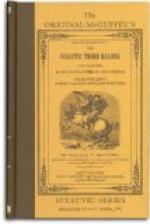11. In short, boys, by slighting your tasks you hurt yourself more than you wrong your employer. By honest service you benefit yourself more than you help him. If you were aiming at mere worldly advancement only, I should still say that good will was the very best investment you could make in business.
12. By cheating a customer, you gain only a temporary and unreal advantage. By serving him with right good will,—doing by him as you would be done by,—you not only secure his confidence but also his good will in return. But this is a sordid consideration compared with the inward satisfaction, the glow and expansion of soul which attend a good action done for itself alone. If I were to sum up all I have to say to you in one last word of love and counsel, that one word should be—Good will.
Definitions.—3. Char’ac-ter, the sum of qualities which distin-guish one person from another. 4. Purpose, intention, aim. 7. Prin’ci-ples, fixed rules. 9. Ca-pac’i-ty, ability, the power of re-ceiving ideas. 12. Sor’did, base, meanly avaricious.
Exercises.—What is meant by the phrase “to apply himself,” in the fourth paragraph? What is meant by “a generous manhood,” tenth paragraph? By “expansion of soul,” twelfth paragraph? Tell what is meant by “good will,” as taught by this lesson. How did Tom and James differ in character?
LVIII. A CHINESE STORY. (156)
By Christopher Pearse Cranch, who was born at Alexandria, Va. (then D. C.), in 1813. He has written some well-known children’s stories, besides numerous poems; but his greatest literary work is “The AEneid of Vergil, translated into English blank verse.” He died in Cambridge Mass., 1892.
1. Two young, near-sighted fellows, Chang and
Ching,
Over their chopsticks idly chattering,
Fell to disputing which could see
the best;
At last, they agreed to put it to
the test.
Said Chang, “A marble tablet,
so I hear,
Is placed upon the Bo-hee temple
near,
With an inscription on it.
Let us go
And read it (since you boast your
optics so),
Standing together at a certain place
In front, where we the letters just
may trace;
Then he who quickest reads the inscription
there,
The palm for keenest eyes henceforth
shall bear.”
“Agreed,” said Ching,
“but let us try it soon:
Suppose we say to-morrow afternoon.”
2. “Nay, not so soon,” said Chang;
“I’m bound to go
To-morrow a day’s ride from
Hoang-Ho,
And sha’n’t be ready
till the following day:
At ten A. M., on Thursday, let us
say.”
3. So ’twas arranged; but Ching was wide-awake:
Time by the forelock he resolved
to take;
And to the temple went at once,
and read,
Upon the tablet, “To the illustrious
dead,
The chief of mandarins, the great
Goh-Bang.”
Scarce had he gone when stealthily




